Title of the Article & Authors
- Article is titled Ginger is Stronger than Chemotherapy for Cancer;
- Authored by Christa Orecchio on The Whole Journey website;
- Author’s name was extracted from the comments section;
- Author is not expressly mentioned in the article;
- Article has a corresponding YouTube video published in 2016.
The article is authored by Christa Orecchio and published on The Whole Journey website. Its title is Ginger is Stronger than Chemotherapy for Cancer. It is also linked to a YouTube video with the same information. I found the author’s name in the comments section as the article lacks an author and date of publishing.
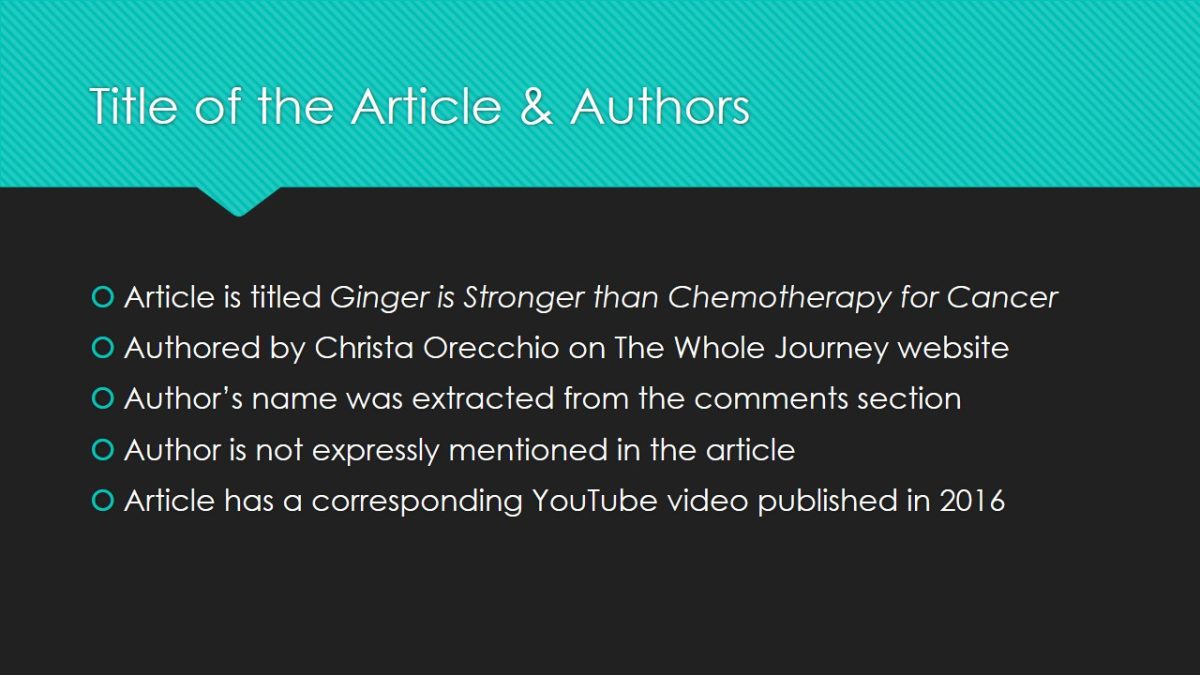
Fake News Content
The article argues that:
- Sundried ginger is 10,000 times more effective for cancer compared to chemotherapy;
- Chemotherapy only kills cancer cells, leading to reoccurrence;
- Ginger powder contains the component 6-gingerol;
- 6-gingerol kills cancer stem cells, preventing reoccurrence;
- Ginger does not harm human cells (Orecchio, 2016).
The article claims that a component of dried ginger, called 6-gingerol, is 10,000 times more effective in cancer treatment than chemotherapy. It argues that while chemotherapy kills cancer cells only, 6-gingerol kills cancer stem cells without any harm to human cells to prevent reoccurrence of the illness (Orecchio, 2016). According to the news, the ginger component kills even cancer stem cells, which are resistant to chemotherapy (Orecchio, 2016). Additionally, the author insists on sundried ginger to achieve maximum benefits.
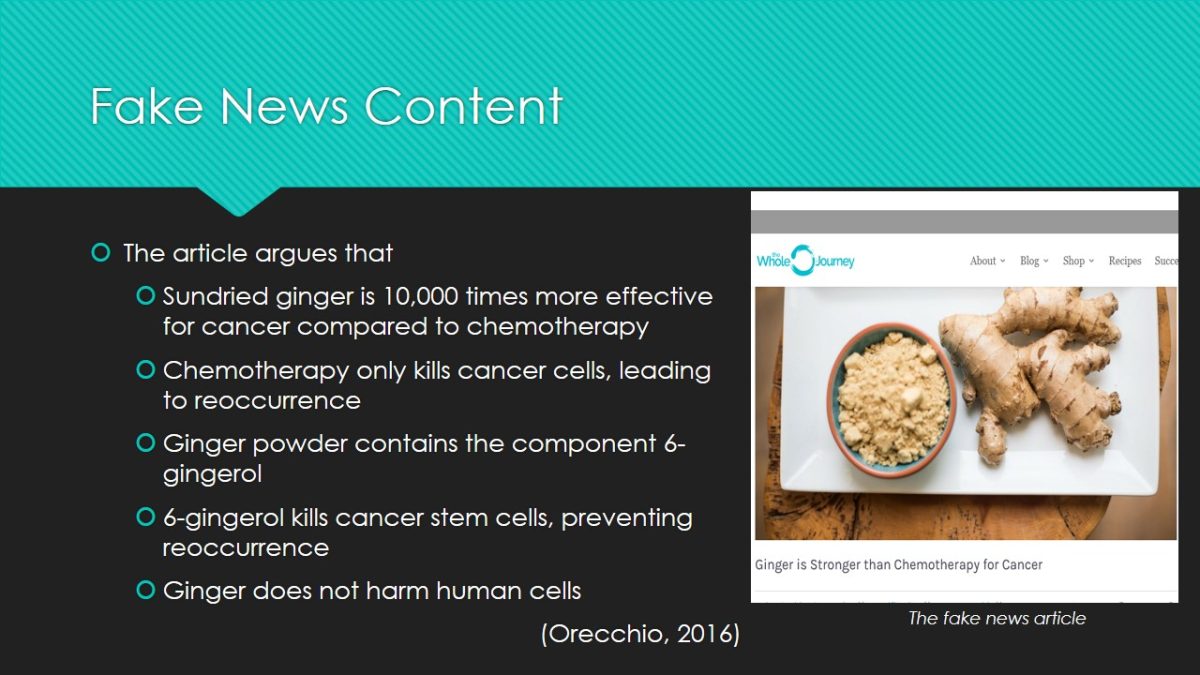
Method of Detection
- Corroboration through a search on Google scholar:
- No research published in peer reviewed articles supports the argument.
- There are peer-reviewed articles against the claim, such as Figure 1.
- Construction:
- The authors are keen on advertising specific brands
- In the comments section, they are constantly telling people not to dry ginger at home but buy from certain brands.
- Facts check:
- Ginger has medicinal value against cancer but not more effective than chemotherapy.
- Until today, scientists are looking for ways to kill cancer stem cells.
- Ginger does not kill the stem cells.
- Chemotherapy uses only 6 microgram/mL IC50 for cisplatin treatment of PC3 cell cultures.
- Ginger uses 250 microgram/mL IC50 for cisplatin treatment of PC3 cell cultures.
- Therefore, ginger is much less effective than chemotherapy (McCarthy et al., 2019).
When the article’s content was checked on peer-reviewed journals, it was non-existent. However, an article was found that directly refuted the claim that ginger is more effective than chemotherapy in treating cancer. Additionally, the authors are directly advertising specific dried ginger brand to readers in the article and in the comments section. Such advise shows an inclination towards advertising the products than informing the reader.
I found a website that conducted investigation into the article’s claim. According to a fact check on the article by McCarthy et al (2019), ginger offers some help with cancer treatment but does not exceed chemotherapy in effectiveness. Ginger’s usefulness is very low, requiring 250 microgram/mL IC50 for cisplatin treatment of PC3 cell cultures where chemotherapy needs only six (McCarthy et al., 2019). Therefore, chemotherapy’s efficacy is much higher than ginger in treating cancer.
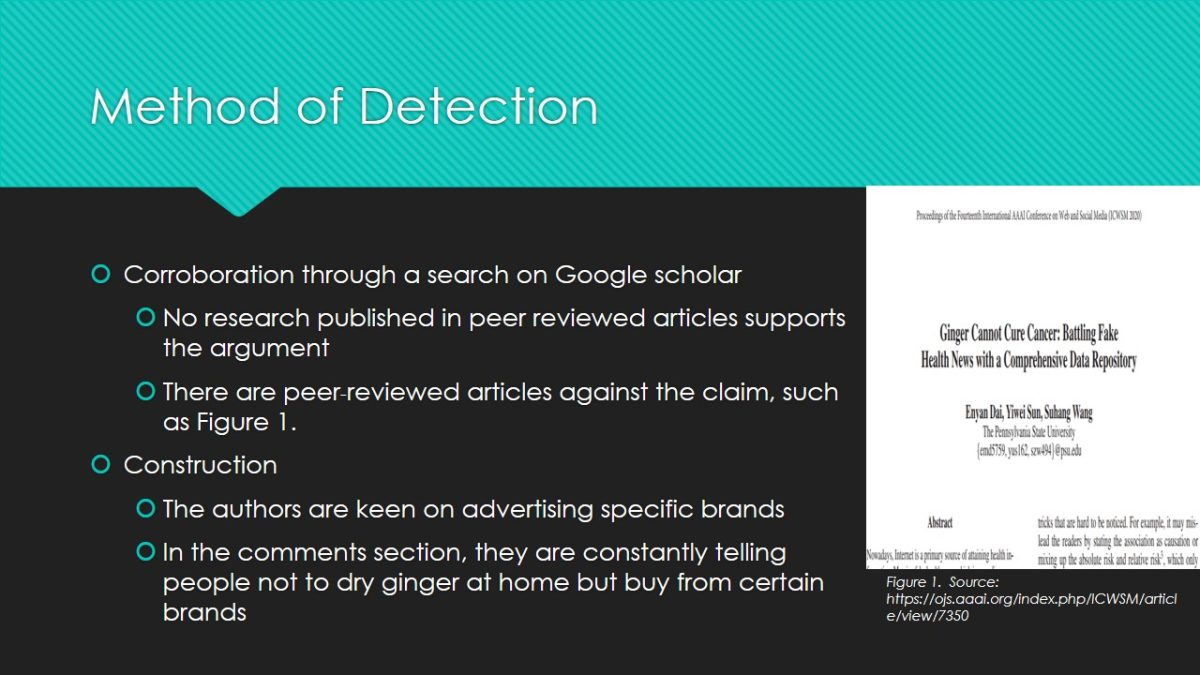
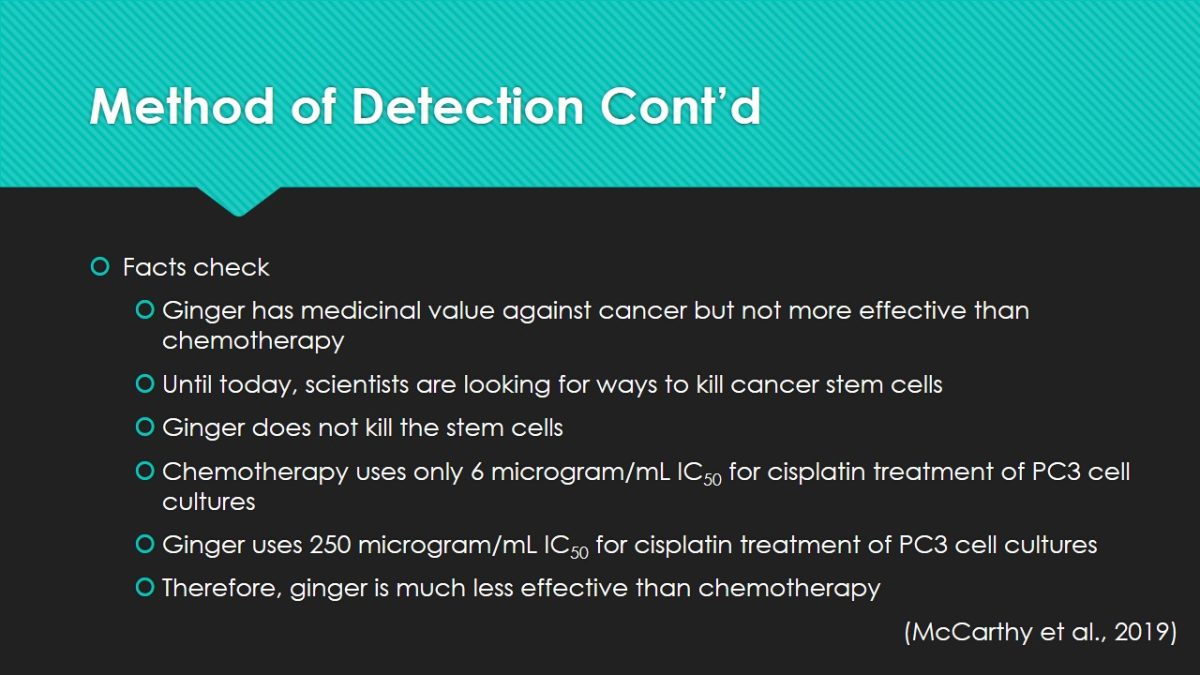
Potential Impact on General Public and Relevance
- Health misinformation creates fear.
- Cancer patients might stop or delay treatments.
- Patients will doubt their physicians and other health providers.
- Patients spend their resources on ineffective products.
- Patients doubt and abandon their treatment plans (Dai et al., 2020).
Health misinformation spreads unnecessary fear and doubts among patients and their families. Cancer patients who believe that ginger can replace chemotherapy will delay or stop treatment, doubt their health providers, spend money on ginger remedies that will not work, and abandon their existing treatment plans (Dai et al., 2020). Such behaviors will increase mortality rates, interfere with advances made in medical field, and reduce quality of life.
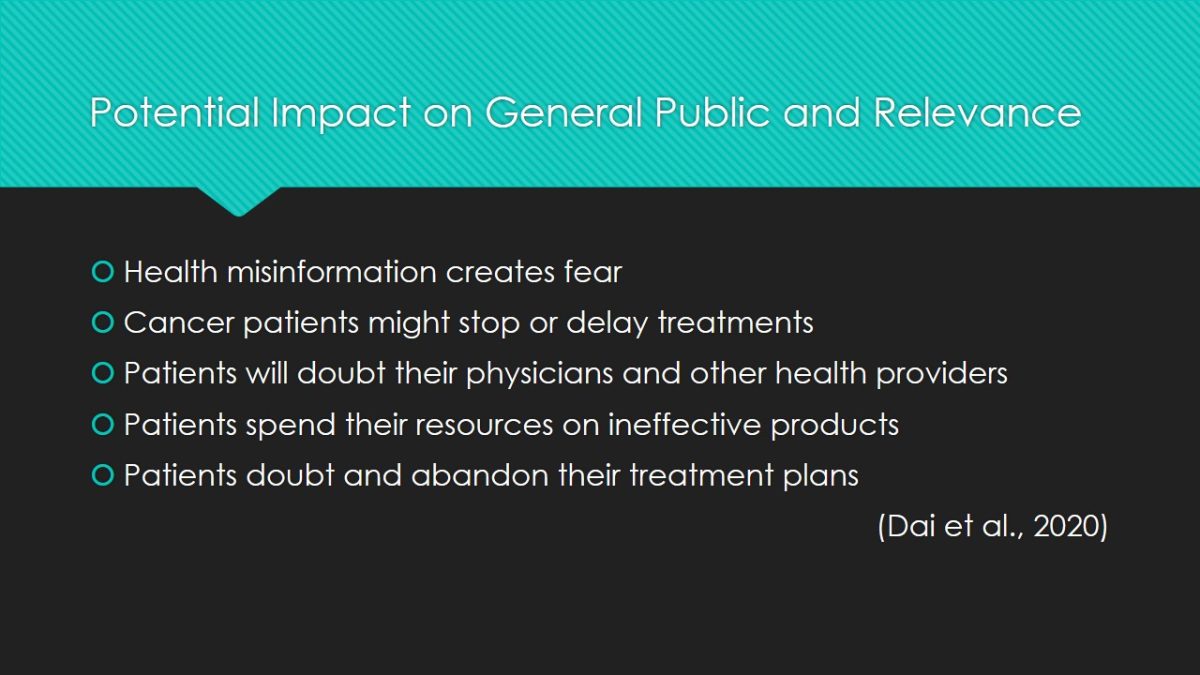
Potential Impact on Nursing Practice and Relevance
- Nurses have to re-educate patients on cancer treatment.
- Need to follow up on chemotherapy patients who abandon treatment for ginger.
- Need to clear the misinformation with patients, their families, and support groups.
- Deal with doubtful patients to make the right choices (Dai et al., 2020).
Fake health news such as this increase the nurses’ workload, requiring them to re-educate their patients on cancer treatment options. Additionally, patients who might consider dropping chemotherapy treatment need the nurse’s follow up and empowerment to continue with the treatment (Dai et al., 2020). The nurse has to clear the misunderstanding with the patient’s family as well to ensure there is enough social support. Doubtful patients will be reluctant to accept chemotherapy sessions (Dai et al., 2020). The nurse has to interview the patient, understand the cause of doubts, and address them.
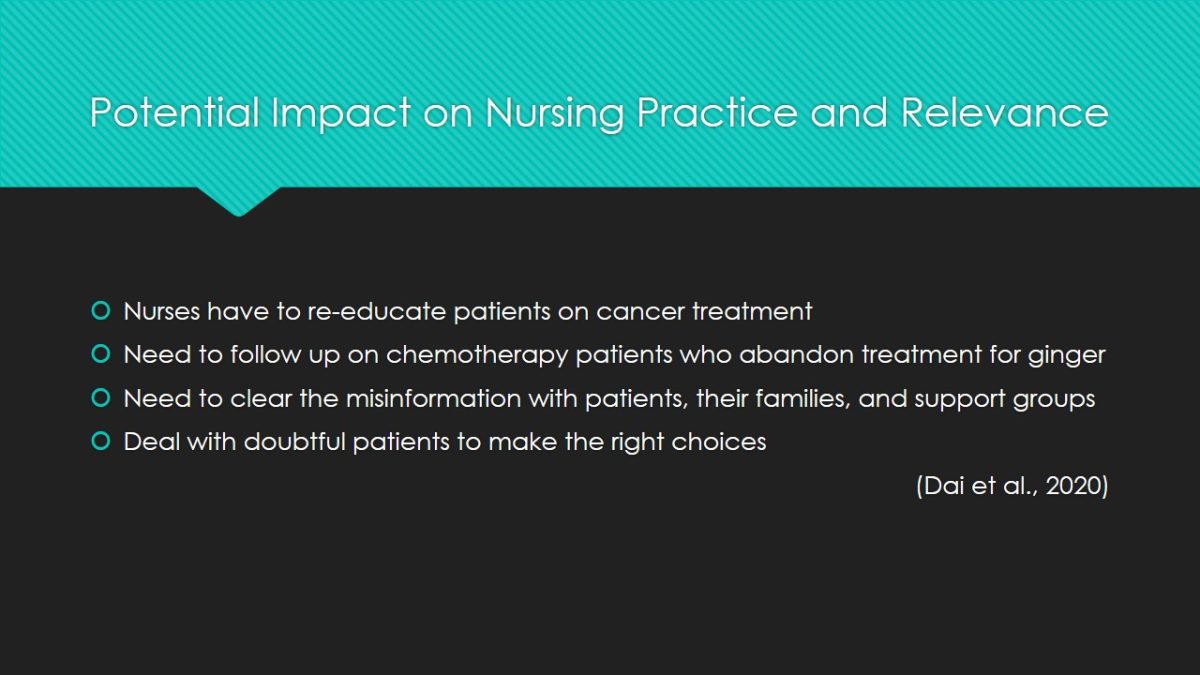
References
Dai, E., Sun, Y., & Wang, S. (2020). Ginger cannot cure cancer: Battling fake health news with a comprehensive data repository. In Proceedings of the International AAAI Conference on Web and Social Media (Vol. 14, pp. 853-862). Web.
McCarthy, A., Hoskin, D., Isenring, E., & Marshall, S. (2019). Claim that ginger is more effective than chemotherapy for cancer treatment is unsupported. Health Feedback. Web.
Orecchio, C. (2016). Ginger is stringer than chemotherapy for cancer. The Whole Journey. Web.